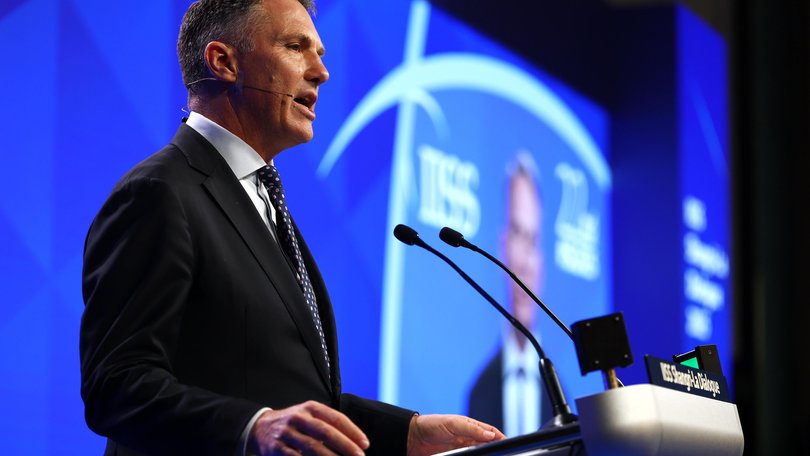Anthony Albanese’s uphill battle on tariffs to reach G7 summit
Expected to meet face-to-face with Donald Trump, will Anthony Albanese be able to deliver a tariff deal that’s in Australia’s best interests?

Prime Minister Anthony Albanese faces his first big foreign policy test of the new term this weekend as he heads to the G7 summit in Canada for a presumed one-on-one meeting with US President Donald Trump.
Mr Albanese, who often spruiks his art of quiet, personable diplomacy, will be under the pump to deliver, if not a signed and sealed carve-out from Mr Trump’s sweeping trade tariffs, at least signs of progress towards a better deal for Australia.
The ability of close ally UK to obtain a temporary reprieve from the US President’s recent executive order to double steel and aluminium tariffs from 25 to 50 per cent only adds to the pressure to nail down a direct discussion with the President and achieve a similar outcome for Australia.
Sign up to The Nightly's newsletters.
Get the first look at the digital newspaper, curated daily stories and breaking headlines delivered to your inbox.
By continuing you agree to our Terms and Privacy Policy.Australian metals exporters are still subject to the stiff 50 per cent, while all other goods have been hit with a blanket ten per cent levy despite Canberra being one of Washington’s closest security allies and the US selling more to Australia than it imports.
While the Prime Minister could legitimately deflect Coalition calls to jump on plane to Washington ahead of the election, there is a growing expectation he should be able to secure facetime with America’s transactional dealmaker-in-chief.
“There would have to be a lot of questions if he can’t get a meeting . . . given the importance of the relationship or how we perceive it, why not?” shadow trade minister Kevin Hogan told The Nightly.

Mr Albanese has, however, expressed confidence about booking a slot in the presidential diary.
“I’m looking forward to meeting Donald Trump face to face. We’ve had three conversations. They’ve been constructive, they’ve been polite and they’ve been respectful,” he told ABC Melbourne on Friday.
Deputy Prime Minister Richard Marles on Monday was also optimistic about the prospects of a G7 sitdown that would reflect the “profoundly important” relationship with the United States.
“I’m sure at some point there will be a face-to face-meeting,” he told Sky News. “We will continue to make our arguments to America in relation to tariffs.”
Assuming Mr Trump does not skip the high-level leaders’ summit as violent street clashes escalate in California over his controversial immigration policies, the G7 would offer Mr Albanese the chance to press Australia’s case privately with the US leader.
His advisers would likely be keen to avoid a higher risk encounter in the Oval Office in the full glare of television cameras, where the unpredictable Mr Trump could put Mr Albanese in an awkward spot on sensitive issues like US demands to raise defence spending to 3.5 per cent of GDP.
The Government has repeatedly played down the US request for such a significant hike in the defence budget from the current two per cent, but the President’s entrenched belief the US is being short-changed on global security raises the likelihood he will press the issue further.

“America is putting this proposition forward. Clearly, we’ll talk with them. But it’s also completely self-evident that we will make the decision about defence spending based on our own national interest,” said Mr Marles about the US spending demands.
“We will continue to make our arguments to America in relation to tariffs, for example, whilst also managing all the defence and security equities that we have with the United States, which we’ve been doing,” he said.
Following reports Australia could lean on making small tweaks to its import ban on some slaughtered beef from the US to sway the President’s mind on tariffs, Mr Marles offered the assurance there would be no offer that would compromise Australian industry standards.
“We will continue to put the biosecurity of this continent front and centre,” he said.
The Opposition’s Kevin Hogan welcomed the expectation of a physical meeting between Mr Albanese and Mr Trump, with a caveat.
“I know that there is good intention to get a carve-out . . . at the same time, we can’t sell out Australian interests. And what do I mean by that? We can’t sell out Australian farmers,” he said.
“One of the issues is traceability. I’m a modest cattle producer myself. You have to know any animal that comes through your farm, you’ve got to know where it’s been before your farm,” he explained.
“We want equivalence in traceability as protection for biosecurity, protection for our industries. So that certainly shouldn’t be on the table.”
Mr Hogan urged the Prime Minister to stress to Mr Trump that his tariff policy was bad for the US consumer, for global growth and global trade.
More specifically, he should leverage the “holistic relationship” between the US and Australia, talking up their tight economic ties, the potential to grow the critical minerals supply chain and their close security partnership, particularly the AUKUS nuclear submarine deal.
“It’s the long-standing allies that we’re being, so I think there’s a holistic way that we discuss this, not necessary things in isolation,” he said.
Mr Albanese on Friday repeated the argument that Australia had not been “singled out for any particularly egregious treatment,” by tariffs imposed across the world, even if it did have a robust case for an exemption.
His Trade Minister Don Farrell on Sunday also reminded the public Australia was seeking another path by expanding its free trade agreements globally to reduce reliance on the US.
“I’m hopeful that those countries around the world who do believe in free and fair trade can reach an agreement to extend free-trade agreements across the globe, so that irrespective of what the Americans might choose to do, we have a greater diversity of trading partners,” Mr Farrell told Sky News.
It’s an approach that is grounded in Realpolitik. The problem for Mr Albanese as he heads to the G7 is that it’s one that is unlikely to satisfy his critics.

